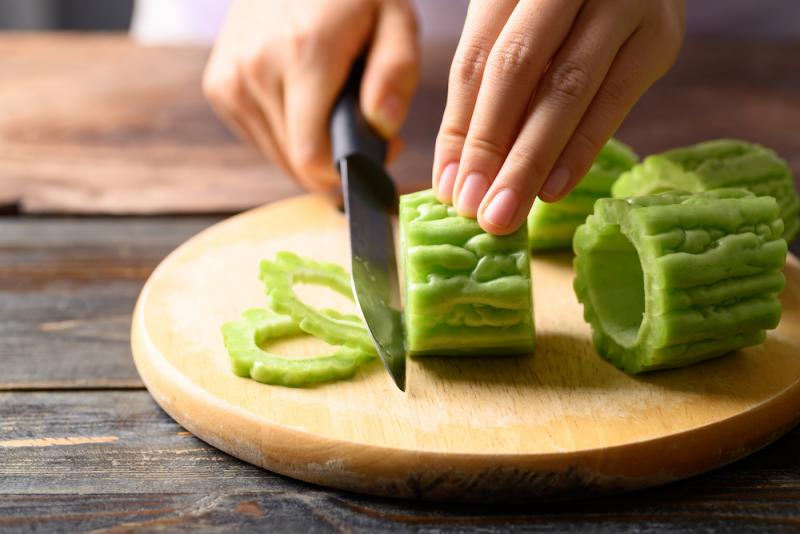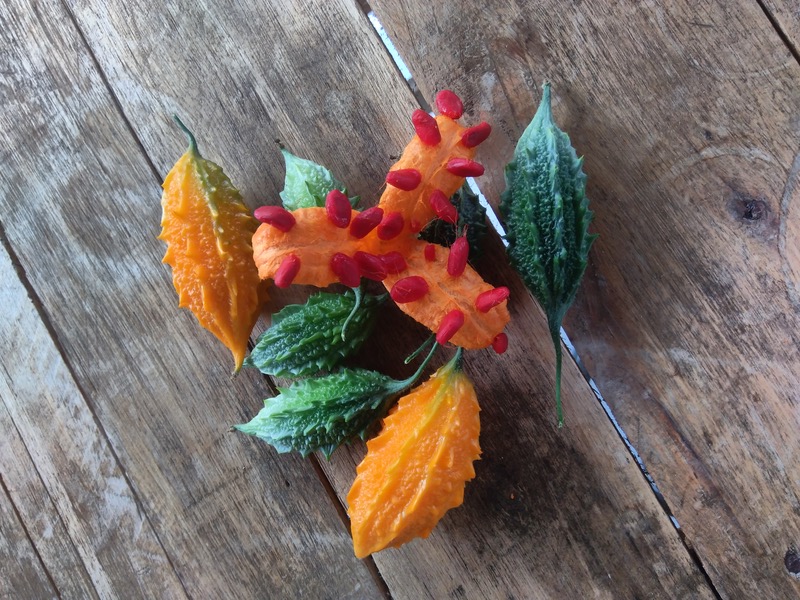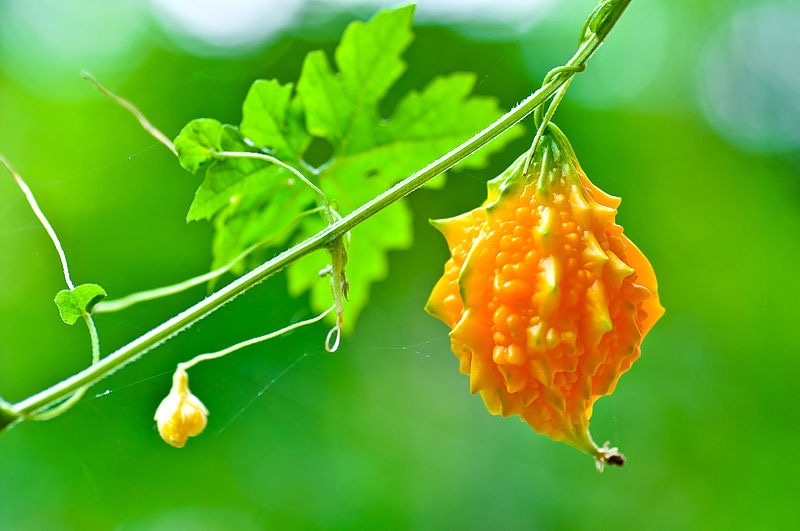
I recently watched a fascinating series on Netflix called Live to 100: Secrets of the Blue Zones. Blue zones are places where a large percentage of the population live to be 100 or more. In the four episodes, best-selling author Dan Buettner talks about 20 years of studying these places in Japan, Costa Rica, Italy, Greece, and even one area of the United States. If you want to live a long and healthy life, I highly recommend watching it.
The number one blue zone is in Okinawa, Japan and as they were discussing the diet of people there, I noticed that one of the foods they were preparing was bitter melon. Bitter melon comes from a vine, native to the tropics, that’s widely used as food in Asia. The young fruit resembles a small cucumber covered with hard bumps. It can be green but there are also orange and white varieties. The mature plant is poisonous when consumed in large quantities, but the correctly gathered young fruits are not.
 The bitter fruits are steeped in salt water to remove the bitterness, which is a common way of reducing the bitterness of many wild foods. They are used in soups, teas, making beer, and are also pickled as a relish.
The bitter fruits are steeped in salt water to remove the bitterness, which is a common way of reducing the bitterness of many wild foods. They are used in soups, teas, making beer, and are also pickled as a relish.
Even though the show didn't talk about bitter melon, it still struck me as something important. That’s because I believe that eating refined carbohydrates is one of the main things that destroys our health and shortens our lives. And, in researching this a little further, I found that bitter melon is a staple in the diet of people in Okinawa and has been identified as a critical component of their longevity diet.
Bitter Melon Benefits
 Bitter melon has been shown to both protect and regenerate insulin-producing pancreas cells. It reduces insulin resistance, improves glucose metabolism, slows carbohydrate absorption, and decreases glucose production, all of which help to lower blood sugar. It’s also one of the herbs that may be helpful for both type 1 and type 2 diabetics. It contains an insulin-like compound called p-insulin. In one clinical trial with nine type 1 diabetics, an extract containing this p-insulin was injected into the bloodstream and shown to exhibit insulin-like activity that started 30-60 minutes after injection and lasted from four to twelve hours. (From Ayurvedic Herbs by Virender Sodhi, MD., pg 259.)
Bitter melon has been shown to both protect and regenerate insulin-producing pancreas cells. It reduces insulin resistance, improves glucose metabolism, slows carbohydrate absorption, and decreases glucose production, all of which help to lower blood sugar. It’s also one of the herbs that may be helpful for both type 1 and type 2 diabetics. It contains an insulin-like compound called p-insulin. In one clinical trial with nine type 1 diabetics, an extract containing this p-insulin was injected into the bloodstream and shown to exhibit insulin-like activity that started 30-60 minutes after injection and lasted from four to twelve hours. (From Ayurvedic Herbs by Virender Sodhi, MD., pg 259.)
However, the benefits of bitter melon are not confined to reducing blood sugar. There are some indications it has antiviral and antimicrobial activity. It has been shown to inhibit H. pylori, which may make it helpful in some cases of gastric ulcers. It’s also been used to treat chronic viral infections like herpes, Epstein-Barr, and HIV. It may also help get rid of parasites and intestinal worms. There is also some research showing it has anticancer effects.
Using Bitter Melon
 You can get bitter melon seeds and possibly grow it if you have a long enough growing season. I decided to order some seeds for next year to start indoors and see if I can grow some. It is available in capsules and the suggested dose is about 100-300 milligrams of the powder three times a day. I would not advise using bitter melon as a stand-alone therapy for parasites, viral infections, or cancer, but I certainly think it could be used as part of a comprehensive health program for any of these conditions, especially where a person craves sugar and carbohydrates.
You can get bitter melon seeds and possibly grow it if you have a long enough growing season. I decided to order some seeds for next year to start indoors and see if I can grow some. It is available in capsules and the suggested dose is about 100-300 milligrams of the powder three times a day. I would not advise using bitter melon as a stand-alone therapy for parasites, viral infections, or cancer, but I certainly think it could be used as part of a comprehensive health program for any of these conditions, especially where a person craves sugar and carbohydrates.
There are a also few cautions to observe with using bitter melon. If you’re trying to get pregnant or are pregnant, don’t use bitter melon. It inhibits fertility and may act as an abortifacient. I wouldn't recommend it if you have low blood sugar, and it’s not recommended for children. Possible side effects from taking too much include nausea, stomach pain, and diarrhea. If this happens, stop taking it until symptoms subside, then try it again at a lower dose.
Downloads
Steven's Articles
-

-
Reishi (Ganoderma) Mushroom
A TCM remedy for calming the shen (spirit), balancing…
-

-
Eucommia Bark
A superior tonic that promotes kidney, structural,…
January
-

-
Goldenthread, Phellodendron, and Yellow Root
Three herbal remedies containing the infection-fighting…
-

-
Teasel
A traditional herb for healing bones and joints…
-

-
Barberry and Healthy Personal Boundaries
A thorny shrub for fighting infections and supporting…
December
-

-
The Evidence for Berberine
A yellow alkaloid found in traditional infection-fighting…
-

-
The Sensible Use of Caffeinated Herbs
Kola nuts, guarana, and yerba mate and other herbs…
-

-
The Health Benefits and Problems with Coffee
This popular caffeinated beverage can be beneficial…
October
-

-
Understanding Caffeine & Cellular Adaptation
Preserving the power of caffeine's buzz and the…
September
-

-
Horseradish
A pungent spice for aiding protein metabolism…
-

-
Banaba or Crepe Myrtle
A beautiful tree from Southeast Asia whose leaves…
August
-

-
Monkeyflowers
Flower essences to help see ourselves more clearly…
-

-
Mariposa Lilies
Strengthening the bond between mother and child…
-

-
The Noble Bay Leaf
A common kitchen herb for aiding digestion and…
-

-
Epimedium: Horny Goat Weed
A circulatory stimulant and kidney yang tonic…

